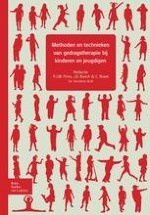2011 | OriginalPaper | Hoofdstuk
5 Gedragstherapeutische socialevaardigheidstraining bij kinderen
Auteurs : Leonieke Vet, Marjan Neef, Maaike Nauta
Gepubliceerd in: Methoden en technieken van gedragstherapie bij kinderen en jeugdigen
Uitgeverij: Bohn Stafleu van Loghum
